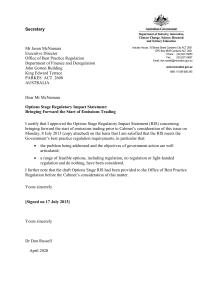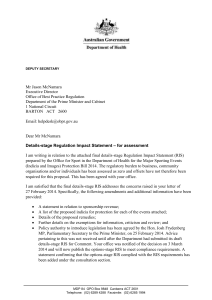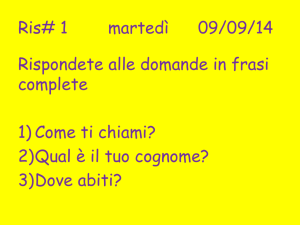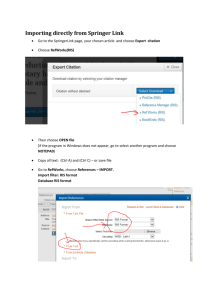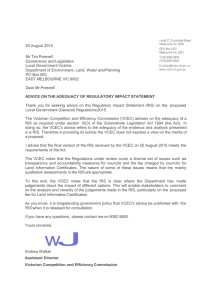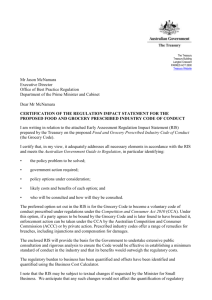Research and Information Services Prepared by:
advertisement
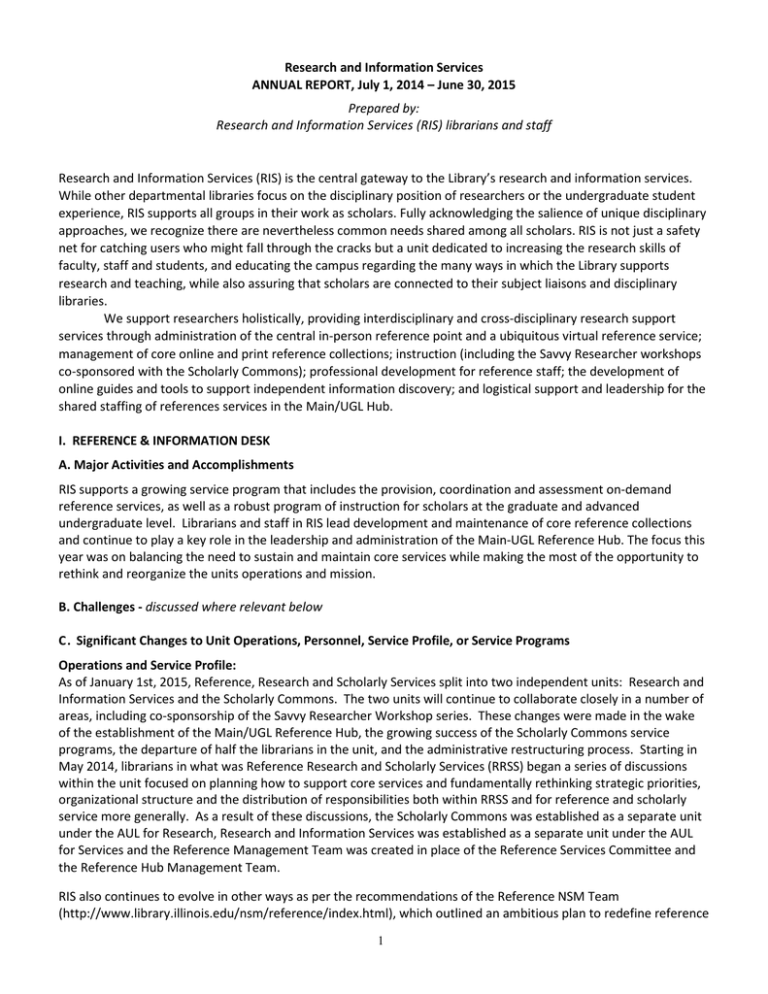
Research and Information Services ANNUAL REPORT, July 1, 2014 – June 30, 2015 Prepared by: Research and Information Services (RIS) librarians and staff Research and Information Services (RIS) is the central gateway to the Library’s research and information services. While other departmental libraries focus on the disciplinary position of researchers or the undergraduate student experience, RIS supports all groups in their work as scholars. Fully acknowledging the salience of unique disciplinary approaches, we recognize there are nevertheless common needs shared among all scholars. RIS is not just a safety net for catching users who might fall through the cracks but a unit dedicated to increasing the research skills of faculty, staff and students, and educating the campus regarding the many ways in which the Library supports research and teaching, while also assuring that scholars are connected to their subject liaisons and disciplinary libraries. We support researchers holistically, providing interdisciplinary and cross-disciplinary research support services through administration of the central in-person reference point and a ubiquitous virtual reference service; management of core online and print reference collections; instruction (including the Savvy Researcher workshops co-sponsored with the Scholarly Commons); professional development for reference staff; the development of online guides and tools to support independent information discovery; and logistical support and leadership for the shared staffing of references services in the Main/UGL Hub. I. REFERENCE & INFORMATION DESK A. Major Activities and Accomplishments RIS supports a growing service program that includes the provision, coordination and assessment on-demand reference services, as well as a robust program of instruction for scholars at the graduate and advanced undergraduate level. Librarians and staff in RIS lead development and maintenance of core reference collections and continue to play a key role in the leadership and administration of the Main-UGL Reference Hub. The focus this year was on balancing the need to sustain and maintain core services while making the most of the opportunity to rethink and reorganize the units operations and mission. B. Challenges - discussed where relevant below C. Significant Changes to Unit Operations, Personnel, Service Profile, or Service Programs Operations and Service Profile: As of January 1st, 2015, Reference, Research and Scholarly Services split into two independent units: Research and Information Services and the Scholarly Commons. The two units will continue to collaborate closely in a number of areas, including co-sponsorship of the Savvy Researcher Workshop series. These changes were made in the wake of the establishment of the Main/UGL Reference Hub, the growing success of the Scholarly Commons service programs, the departure of half the librarians in the unit, and the administrative restructuring process. Starting in May 2014, librarians in what was Reference Research and Scholarly Services (RRSS) began a series of discussions within the unit focused on planning how to support core services and fundamentally rethinking strategic priorities, organizational structure and the distribution of responsibilities both within RRSS and for reference and scholarly service more generally. As a result of these discussions, the Scholarly Commons was established as a separate unit under the AUL for Research, Research and Information Services was established as a separate unit under the AUL for Services and the Reference Management Team was created in place of the Reference Services Committee and the Reference Hub Management Team. RIS also continues to evolve in other ways as per the recommendations of the Reference NSM Team (http://www.library.illinois.edu/nsm/reference/index.html), which outlined an ambitious plan to redefine reference 1 service at Illinois as a shared enterprise that operates seamlessly from the user’s perspective. Building on long-term efforts to build forward-thinking reference services based on assessment and attention to emerging research needs, information seeking habits, and usage data, RIS played key leadership roles in working with the Main/UGL Reference Hub Management Team to propose the creation of a 1st floor service point combining walk-up services with research consultations in a highly visible location. This proposal, which would afford staffing efficiencies across multiple units, is appended to the Main/UGL Reference Hub Annual Report for FY15. Personnel: Research and Information Services ends the year with a leaner staff through the combined result of the RRSS reorganization and librarian departures. The librarian position head count was reduced from 6 to 3. • • • • • Departures: Three librarians, Kathleen Kern, Jenny Taylor and Mark Wardecker, left the Library. Transfers out: Two librarians, Merinda Hensley and Karen Hogenboom moved fully into the Scholarly Commons as part of the RRSS reorganization. Transfers in: One librarian, Carissa Phillips, moved from the Scholarly Commons to RIS. Carissa retains responsibility for much of her prior business related instruction and research consultations, and data services which accounts for roughly 50% of her time Continuing: One librarian, JoAnn Jacoby, one AP, Sarah Christensen, and one Library Operation Associate, Wendy Gregory Pending hires: Visiting Research and Instruction Librarian (with responsibility for GA supervision and instructional programs), Jessica Moyer starting July 2015 and the Classics/RIS Librarian (50%/50%) search slated to open in Fall 2015 Challenges: • Three full-time librarians departed this year and two shifted entirely to the Scholarly Commons o Our strategy of shifting positions and responsibilities from reference to scholarly services left little flexibility to absorb recent departures. There is a need for experienced librarians to provide leadership for the further evolution of reference services. • All levels of staff have been taking on additional responsibilities for both Library-wide services as well as specific subject areas. Many RIS librarians have specific responsibilities beyond RIS (e.g. Business and Finance, Classics, Visual Resources). While there is considerable benefit to this sort of programmatic integration, there are some drawbacks: o Casual observers may conclude that RIS programs are more heavily staffed than they actually are if they aren’t aware of these cross-cutting commitments. o These commitments limit our ability to cover both long-term and short-term gaps in coverage of core operations in our primary service areas, including the provision of consistent mentoring and oversight of new GAs and new staff. Facilities & Space: • The relocation of VR Desk to 204 Library allowed for reduction of staffing on the Info Desk, one experienced person in the evening can monitor and be available for referrals after 7 pm. C. Ways In Which The Unit And/Or Its Staff Contributed To Library-Wide Programs Information Services: Reference services RIS is the central gateway to the Library’s information and research services and has played a key leadership role in the development and success of the Main/UGL Reference Hub. The Information and VR Desks are the busiest reference service point in the Library and provide the only walkup and IM reference services open between semesters. The Info Desk fields all email questions that come in through the Ask-A Librarian Service as well as the phone calls that come in through the primary library phone number. Both affiliated and unaffiliated researchers rely heavily on the in-depth 2 reference services and referrals provided by RIS to make effective use of their time. For the third year in a row, reference activity is higher than directional, suggesting this is a persistent trend possibly due in part to website improvements combined with changing use patterns with more research being conducted remotely and the growing numbers of faculty and graduate students making use of the chat service rather than visiting in person. If way-finding signage in the Main Library were improved, directional activity would likely decline further, allowing us to focus more time on substantial research inquiries. Both reference (-11.6%) and directional (-7.7%) activity declined in FY15. Having noted the decline in directional questions and taking advantage of the relocation of the VR Desk to 204 Library, we will be further reducing staffing on the Info Desk during the least busy shifts in Fall 2015. It is worth noting that activity during summer, intersessions and breaks held steady, suggesting that much of the decrease can be attributed to greater participation by other units and reference hubs in chat reference during the fall and spring semesters, • • With support from GAs from the Undergraduate Library, RIS librarians, APs, staff and GAs provided primary ondemand reference services for the Library as a whole during the summer and breaks. The summer is a critical time for faculty, graduate students, and visiting scholars to focus on their research and activity continues to grow disproportionally during this time of year. Provided sole coverage of central reference services during the reduced service days between Christmas and New Year’s. Main/UGL Reference Hub • Played key leadership roles in the management of Main/UGL Hub reference services, including the development of policy, training programs, and assessment. • Provided the sole staff support (through the outstanding work of the Senior Library Specialist) for scheduling more than 60 people across the VR and Information Desks as well as ensuring that planned and unplanned absences and trades are covered. • Provided 356 hours per week (45% of the hours) for the Main/UGL Hub reference services at the Information and VR Desks during the Fall 2014 and Spring 2015 semesters. Government Information Services Government information is led by a Coordinator for Government Information Services, Access and Collections who reports directly to the University Librarian, but there has historically been a close collaborative relationship with RIS. On-demand support for government information services are integrated into the VR and Information Desks (with referrals made as necessary for questions demanding expert assistance) and the basic print reference tools, primary microfiche collection and CDs/DVDs/Video resources are located in the north end of the Reference Reading Room in 200 Library. The Coordinator and her Graduate Assistant(s) participate in reference services at the Information and VR Desks, while RIS librarians with expertise in state and national government resources help support research referrals. Librarians and GAs with expertise in web content creation also work with the Government Information Services to help develop and maintain web pages. Citation Management Based on analysis of RefWorks usage statistics, recommended a Citation Management Working Group be convened to evaluate the Library’s current portfolio of software support and services related to citation management; to make recommendations for changes and improvements to that portfolio; to coordinate any such changes; and to offer support and direction for librarians and users as changes are implemented. User Experience • Kathleen Kern and Mark Wardecker served on the Content Sub team of Web Team Delta and many RIS librarians have contributed actively to the development of the new gateway. • Merinda Hensley and the Instruction GA maintained the LEARN site for the past year with the understanding that these pages would be migrated to a new CMS in the near future. Most of the year was spent double-checking pages for content changes and updating links. Responsibility for the site was moved to RIS this spring as part of the RRSS reorganization. • With Lisa Hinchliffe and Lori Mestre, JoAnn Jacoby organized a team of CPS librarians and APs to work with 3 • Web Team Delta to review and assess second level webpages directed at a Library-wide audience and decide how to present that content in the future. The scope includes material currently available through the “How Do I?,” “Find,” the LEARN site and various LibGuides. Merinda Hensley continues to work with several RIS GA’s to add content and photos for Illini Spaces, a mobile-compatible web application designed In partnership with Technology Services to help students at the University of Illinois at Urbana-Champaign find study spaces and CITES computer labs on campus.. The number of spaces featured grew from 50 to 106 in time for Fall 2015. Merinda worked with a GA to develop a workflow for intake of spaces and Technology Services will be releasing the corresponding iPhone app in September 2015. (https://illinispaces.illinois.edu). The uptake of this tool will be assessed at the end of the fall semester and a decision made about whether to transfer responsibility for Illini Spaces to RIS. Collection Management: • The reference collection continues to transition from print to online as the preferred format of materials. • Major online purchases included selected titles from the Gale Virtual Reference Library and Oxford Press, including coordinating a multi-fund purchase of Oxford’s Very Short Introductions. Diversity Efforts • GA recruitment for FY16 focused on building a diverse group of new GAs and we were successful in hiring a group that is diverse across a number of dimensions. • Coordinated library involvement and taught sessions on research skills and gave tours to the Summer Predoctoral Institute, a program that helps prepare incoming doctoral students from underrepresented populations for graduate-level research and the Summer Research Opportunity Program geared toward undergraduates. Staff Training and Development • Librarians in RIS have a key role in providing reference training for all graduate assistants and new staff at the library-wide GA orientation, leading or co-leading 4 sessions. • Jacoby coordinated the Main-UGL Reference Hub training, RIS librarians teach numerous sessions and RIS provides GA support for developing supporting online training materials. • The Savvy Researcher, co-sponsored with the Scholarly Commons, continues to serve as a staff training program and appropriate workshop invitations are sent via LIBNEWS on a routine basis throughout the semester. • All new RIS graduate students participated in an intensive training program; and ongoing training is provided to all new and continuing GAs throughout the year through regular meetings and special workshops. • RIS GAs worked with Staff Development and Training to write, film and act in a video for GREAT customer service training. Outreach and Public Engagement • Using funds awarded from a marketing grant, an RIS graduate student hired and managed undergraduate students to design digital signage templates for marketing and outreach purposes in the Main Library. The students, both graphic design majors, created 20 signs including a “meet a librarian” template, two Savvy Researcher signs, and numerous other signs highlighting special collections. • Gave 21 tours attended by 141 individuals. Developed and updated online tours and videos: http://www.library.illinois.edu/learn/intro/index.html#tours. • Updated and significantly expanded the Wikipedia entries for the Main Library and the University Library. • Serve as primary point of contact for alumni and community members who make use of the library’s collections and services. Maintain http://www.library.illinois.edu/learn/users/visitors.html. • Osher Lifelong Learning Institute (OLLI) – Sarah Christensen coordinates Library outreach to this program. She taught 2 OLLI basics sessions, arranged a special session with Jennifer Teper on preserving personal items, and led two tours for OLLI students. • Participated in outreach events including Quad Day (Christensen), Bronze Tablets (Christensen and GAs) and New Faculty Orientation (Jacoby). 4 • Serve as a resource for Library Advancement in the development of outreach materials and research on Library history and current services. • With input and editorial oversight from Heather Murphy and Sue Searing, created the “8 Things To See at the Library” brochure which highlights notable art and unique features in the Main Library. • Sarah Christensen administers ExploreCU - a mobile application that curates the arts and history in Champaign-Urbana: http://explorecu.org/--- continues to work to bring the local and academic communities to using this unique mobile application. ExploreCU strengthened its relationship with the City of Urbana by working with the city arborist, Mike Brunk, to create an Urbana Tree Tour. In addition, a survey was administered to the community in order to provide direction for future development. E. Goals Progress Toward FY15 Goals • Completed RRSS restructuring process, providing a strong foundation for Library-wide reference and research support services with leaner staffing levels. • Made the Reference Reading Room (200 Library) available for donor and other events. • Evaluated trends in reference activity levels to determine optimal levels of staffing across the Main-UGL hub service points. Used reference data and staff feedback to adjust staffing levels and shift staff across the virtual and in person desks and shared our approach with the Coordinator for Assessment as an example of how other units might use Desk Tracker for assessment and evaluation. • Used and provided training on using the READ scale to assess the effort and level of staffing expertise needed to answer reference and directional questions. Goals for FY16 and beyond • Our primary goal will be to realign existing staff responsibilities to cover core service commitments and hire and recruit excellent staff for all open positions. • Better integrate insights gleaned from our broad and deep level of interactions with our diverse users into IT systems and web development by becoming a trusted advocate for the needs of the scholarly community as a whole. • Continue to focus on developing innovative approaches to reference and research support services that benefit the entire community of scholars who rely on the Library’s world-class collections and services. • Finish the 200 lighting project by working with Facilities to purchase table top lamps in keeping with the grandeur of the reading room II. INSTRUCTIONAL PROGRAMS RIS librarians and GAs taught 101 group presentations reaching more than 1550 students; 80 were instructional sessions; 21 were tours. RIS provides support for two major graduate-level instruction initiatives, the Savvy Researcher series and ESL 500level classes for international students. RIS teaches the main core of the Savvy Researcher and it is also a platform for teaching new GA’s to learn how to teach through the peer-learning program. This year, Merinda and the Instructional Services GA (Heidi Johnson) held two peer learning workshops on expectations for the department, one for the GA’s and one for the librarians. English as a Second Language (ESL) for Graduate Students , Post-docs & Visiting Faculty: 48 sessions, 659 students • For the past few years, Cindy Ingold, the Multicultural Services Librarian, has coordinated this instruction program. In FY16, Jessica Moyer, Visiting Research and Instruction Librarian will partner with Cindy Ingold in coordinating this instruction program with the intention of Jessica taking on sole responsibility for the 5 • • • program in FY17. The number of ESL sections has increased. Enrollment in ESL classes has increased and sections specifically for PHD students, post docs and visiting scholars have been added. All but 4 sessions taught or co-taught by RIS librarians & GAs. Ingold and GA’s from IAS also teach sessions As a pilot, Jacoby invited a Grainger librarian to co-teach in a session with students exclusively in scientific and technical fields. This was successful, so we will expand to include other STEM librarians when appropriate in the fall 2015. Savvy Researcher: 16 sessions, 344 students taught by RIS faculty, APs and GAs • The Savvy Researcher Workshops will continue to be co-sponsored by RIS and the Scholarly Commons • Most GA’s in RIS participated in teaching Savvy Researcher sessions and Sarah Crissinger played a crucial role in the development of a new seminar series, “Creating your online scholarly presence,” which was held in Spring 2015. • Merinda and the Instructional Services GA marketed and promoted the Savvy Research through flyers and emails campus-wide and included targeted promotion through the weekly mailing list, GradLinks. Messages went out to the subject liaisons as well, to be forwarded to campus departments. Summer Pre-doctoral Institute and Summer Research Opportunities Program: 2 sessions & tours, 45 students Undergraduate Research: 12 sessions, over 450 students • Merinda and the Instructional Services GA taught sessions for the Ethnography of the University Initiative and as part of the Savvy Researcher on how to build a research poster. Departments and programs include Mechanical Engineering, Applied Health Sciences, the Rhetoric program, and the Undergraduate Research Symposium. Merinda worked on a new series of workshops to be part of the Undergraduate Research Certificate, sponsored by the Office of Undergraduate Research which will be taught Fall 2015. • The Undergraduate Research Program will part of the Scholarly Commons profile next year Online instruction • Learn Twitter account: This twitter feed is in its third year and aims to highlight library resources and services through @learnlibrary. There are 470 click-throughs that go beyond the boundaries of the US to the UK, Spain, Australia, and beyond. A tweet about the “Creating your online presence” got the most clicks at 13 on 9/23/2014. The @learnlibrary account provides research tips, promotes events happening at libraries across campus, and we try new things according to follower needs. Number of tweets: 1018 (716 in 2014). Following: 587 (447 in 2014). Followers: 336 (224 in 2014). An RIS GA writes a comprehensive Twitter report, should anyone be interested in reading it. • LibGuides: The focus in FY15 was on deleting duplicate or outdated LibGuides and revising content in preparations to the migration to LibGuides 2.0. There are currently 45 LibGuides under the RIS account with 73,134 views. RIS GAs also worked on content for the RIS LibGuides that support Savvy Researcher workshops. Tours • • • • • • • 13 new student tours with a total of 35 students 2 Osher Life Long Learning (OLLI) tours with a total of 11 people 1 Fulbright scholars group (5 people) 1 Chinese librarian exchange program (26 people) 1 Summer Predoctoral Institute (SPI) scholars group (15) + instruction session 1 Summer Research Opportunities Program (SROP) scholars group (30) + instruction session 2 Community of scholars groups (19 total) II. Statistical Profile 6 1. Facilities User Seating • 200 (Reference Reading Room) & 204 (Info Desk Area) Total = 390 o At tables = 336 At long tables: 38 tables (200) and 2 tables (204) x 8 seats each = 320 At round tables: 4 tables x 4 seats each = 16 o At public workstations: 32 o Informal/other: Soft seating: 22 B. Personnel Faculty – 3 (FTE & Headcount) Tenure System Faculty: Head - JoAnn Jacoby (100%) Business and Finance Information Librarian - Carissa Phillips (100%) o Also has responsibilities related to business, e.g., providing research consultations and instruction for the Illinois Business Consulting project teams, and other courses, faculty and students in business and finance. Visiting Faculty: Visiting Reference (GA Coordinator and Instruction Services) – Jessica Moyer (100%) Departed: Jenny Emanuel (100%); appointment ended August 2015 Kathleen Kern (100%); resigned February 2016 Mark Wardecker (Visiting) (50%); resigned effective Aug 2015 AP – 1 FTE & Headcount Visual Resources and Outreach Specialist – Sarah Christensen (100%) Staff – 1 (FTE and Headcount) • Wendy Gregory (Library Operations Assistant) (100%) Student Wage Budget – $5,221 Graduate Assistants Information Desk GAs 4.25 FTE state funded (4.0 requested, additional .25 used to hire grad hourly) Caitlin Archer Helke Caitlin Crane Sarah Crissinger Jody Ford Kimberly Foster Emily Hardesty Heidi Johnson Ira King Kate Lambaria Sveta Stoytcheva Clara Volker .5 FTE .385 FTE .385 FTE .35 FTE .35 FTE .35 FTE .5 FTE .25 FTE (paired with UGL) .25 FTE (paired with MPAL) .25 FTE (paired with IAS) .35 FTE August 2014-May 2015 + summer hourly August 2014-May 2015 August 2014-May 2015 + summer hourly August 2014-May 2015 + summer hourly August 2014-May 2015 + summer hourly August 2014-May 2015 + summer hourly August 2014-May 2015 + summer hourly August 2014-May 2015 + summer hourly August 2014-May 2015 + summer hourly August 2014-May 2015 + summer hourly August 2014-May 2015 + summer hourly 7 These GAs and graduate hourlies provide reference services (including in person and chat), teach sessions for ESL classes and lead Savvy Researcher workshops, and work on a variety of other projects related to their primary job duties and the needs of the unit and the Library Information Desk GA Projects FY15 Category Examples of Specific Projects Approximate Hours Instruction Projects Updating workshop scripts, designing online materials for instruction including LibGuides Teaching ESL instruction sessions, teaching Savvy Researcher workshops Leading general tours of library, leading special tours on request RIS and Hub Wikis, Compass training modules 175 Hours contributed to staffing the SC desk E-reference comparison and analysis Updating LEARN website and RIS website, Explore CU Administration for GA meetings and Hub training meetings, rolodex FAQ updating, statistical analysis for reference planning, work for librarywide activities, etc. 70 30 200 Classroom Instruction Tours Development of staff training materials Scholarly commons Collection development Web Work Other Projects 3. 250 40 75 300 User Services Gate count for year (Actual): 150,315 (300,629÷2, to correct for entry/exit) – 11% increase Gate count for the Reference Reading Room (200 Library) was back up this year than last year, probably due to a decrease in construction activity compared to last year. During the summer the installation of the renovated printer mark windows caused considerable noise, but most of the room remained open and accessible. Peak room usage in 200 Reading Room: 194 people on December 11, 2014 at 3:30 PM. Peak laptop: 164 on December 11, 2014 at 4:30 PM. Reference Information and VR Desk: In departure from past practice, this data reported this year combines both the Information and VR Desk. The distinction between the two desks is increasing aritificial since during less busy times of the day )as well as summer, breaks and intersessions), chat is monitored from the Information Desk. Looking at both desks should make it easier to track trends over time. Information and VR Desk Reference Activity By Type of Interaction: TYPE OF INTERACTION FY15 FY14 (last year) Directional Reference 5,775 6,260 19,449 21,995 8 Totals 25,224 28,255 % Change from FY14 to FY15 -7.7% -11.6% -10.7% Information and VR Desk Reference Activity By Mode of Interaction MODE OF INTERACTION Chat‡ Fall and Spring semesters * Summer and Interims Phone In-person Email SMS Uncoded Totals % Change FY14 to FY15 41.7% 9.9% 43.7% 3.2% 0.1% 1.4% 20,283 -12.8% 34.1% 18.3% 38.5% 8.0% 0.2% 0.9% 4,941 -0.9% **Fall and spring semesters are also reported in Main/UGL Hub Annual Report, because they are cooperatively staffed. They are included here for seasonal comparison of activity patterns and because daily management of the Info Desk is provided by RIS. Overall activity has declined for the second year in a row, although to a lesser degree (10.7%, versus 15.3% in the prior year). Interactions classified as directional continue to go down perhaps due to changing use patterns (more people doing research online) in combinations with website improvements. If the decrease in directional questions is due in any part to the web redesign, then we can expect further decrease in directional questions as we continue to improve the online user experience. Further Improvements wayfinding signage in the Main Library would likely further decrease in directional questions. For the third year in a row, reference interactions were more numerous than directional interactions (this would have pertained even if the VR Desk had not been included). Summer and interim traffic saw only a slight decline over last year (<1%) while traffic in the fall and spring semesters declined 12.8% from the prior year. This continues a multi-year trend of steady or increased reference activity in summer, breaks and interims, perhaps due to the increase in summer course offerings, as well as the increasing use of the chat service by faculty and graduates who may find it easier to connect with reference providers when they may be doing research away from campus during summer and intersession. The decline in fall and spring activity is a more recent trend, likely attributable to the growing participation of departmental libraries (including Communications, Funk-ACES, Grainger and Social Sciences, Health and Education) in chat services during the fall and spring semesters and more frequent referrals of chat questions. That is, some traffic that was formerly handled by the VR and Info Desk is now being routed more directly to subject specialists. We will continue to monitor activity levels and adjust staffing levels accordingly. Sweeps Week Extrapolation in Comparison to Actual Activity, Fall 2014 and Spring 2015 Sweeps Weeks Extrapolation Deviation from Actual Chat Phone In-person Email SMS Totals 9,344 1,488 4,400 560 32 15,824 10.5% -25.9% -50.4% -14.5% 23.1% -20.9% Sweeps Week numbers from Fall 2014 and Spring 2015 were closest in estimating the actual number of chat, overestimating the actual number by 10.5%. Otherwise (with the exception of SMS/Text), the Sweeps Week numbers substantially underestimated the actual numbers, by 50.4% in the case of in-person interactions. 9 Number of hours open to the public per week: Info Desk & Reference Reading Room: o Summer II 2012: 55.5 o Summer Intersession: 42.5 o Fall 2012: 83.5 o Winter Break: 42.5 o Spring 2013: 83.5 o Summer I 2013: 55.5 o Summer I 2014: 35 (up from 20) Presentations • Number of presentations to groups: 101 • Number of participants in group presentations: 1550 10
